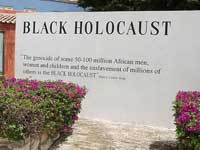The Black Holocaust
 The Black Holocaust makes reference to the millions of African lives that have been lost during the centuries to slavery, colonization and oppression. It makes reference to the horrors endured by millions of men, women, and children throughout the African Diaspora. In sheer numbers, depth and brutality, it is a testimony to the worst elements of human behaviour and the strongest elements of survival.
The Black Holocaust makes reference to the millions of African lives that have been lost during the centuries to slavery, colonization and oppression. It makes reference to the horrors endured by millions of men, women, and children throughout the African Diaspora. In sheer numbers, depth and brutality, it is a testimony to the worst elements of human behaviour and the strongest elements of survival.
Unknown numbers (probably at least 4 million) of Africans died in slave wars and forced marches before being shipped. Within central Africa itself, the slave trade precipitated migrations: coastal tribes fled slave-raiding parties and captured slaves were redistributed to different regions in Africa.
African slave trade and slave labour transformed the world. In Africa, slave trade stimulated the expansion of powerful West African kingdoms. In the Islamic world, African slave labour on plantations, in seaports, and within families expanded the commerce and trade of the Indian Ocean and Persian Gulf. In the Americas, slave labour became the key component in trans-Atlantic agriculture and commerce supporting the booming capitalist economy of the 17th and 18th centuries, with the greatest demand in the Americas coming from Brazil and the sugar plantations of the Caribbean.
The Resistance
-Many Africans, like Queen Nzingha of Angola and King Maremba of the Congo, fought valiantly, if vainly, against the European slavers and their African collaborators. Others resisted their captors by creating mutinies or jumping overboard from slave ships during the horrendous "Middle Passage" across the Atlantic Ocean. Enslaved Africans that were destined for the Americas would be subject to a "breaking in" process, which often took place in the West Indies. Many resisted having their spirits broken and managed to escape, eventually forming independent communities such as that of the Maroons in the West Indies. Some of these Maroon communities numbered in the 1000s in South American and the Caribbean, waging guerrilla warfare against slave hunters, and brutally executed if caught.
The Diaspora – The forced and brutal dispersal of millions of Africans into foreign lands created the Black Diaspora. African slaves and their descendants carried skills and community spirit, rich cultural traditions, resiliency, and resistance ethos that transformed and enriched the cultures they entered around the world. Thus, as African peoples are globally dispersed, they carried their traditions of cultural creativity and oral arts with them, such as "common musical rhythms, exploration of multi-colours .. and diverse textures, play on repetition, and call-and-response modes of verbal activity". African folktales, often featuring the tortoise, hare, and spider, are widespread in Africa and were carried from there to the Caribbean, Latin A & the US.
These traditions survived despite concerted efforts by Europeans including separating those from the same ethnic groups, renaming them with slave names, and removing African instruments such as drums from their midst for fear that they would be used to communicate. Nevertheless Africa’s indigenous personality has managed to remain intact and continues to maintain a considerable sphere of influence on the global stage, particularly in its orally-based forms of cultural expression."


